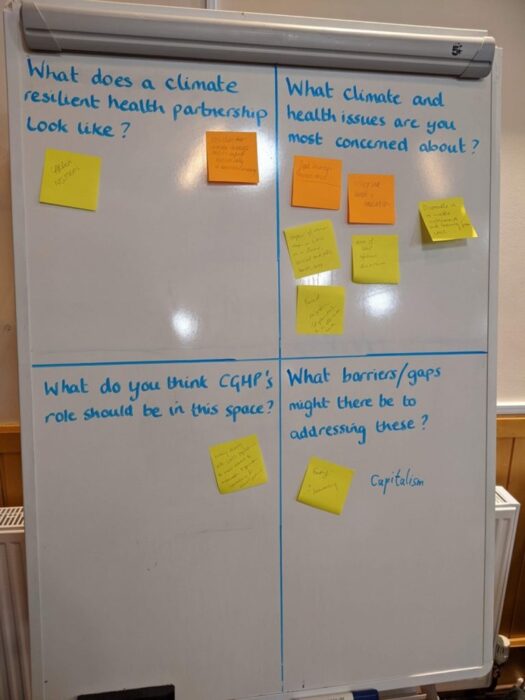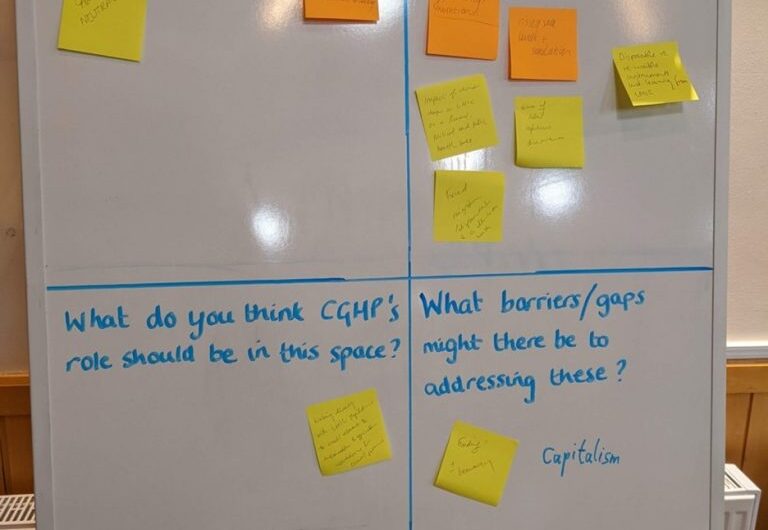By Dr Emily Loud
In this blog, Emily shares her thoughts and scoping research on climate change in global health partnerships.
Emily is an ST3 public health registrar, who has just finished working in local authority, and is now beginning a placement at her local integrated care system (ICS). She has a keen interest in climate change, and the many ways in which this is already having an impact on health globally. Her research interests include pandemic preparedness, immunisation, childhood nutrition and health promotion.

From the heatwaves and wildfires in summer 2022, to Just Stop Oil’s evolving antics, to the COP27 conference in Egypt last November, climate change was hard to miss in 2022. The challenge for the health community globally now is how to respond to “the greatest threat and opportunity for public health” of this century.
We know that climate change is already impacting health around the world. Impacts range from 2,800 excess deaths in the UK’s heatwave, to the unfolding malnutrition crisis in East Africa due to the “worst drought on record”. The moral imperative for action from health professionals is therefore clear. The next question is – what can an organisation like Cambridge Global Health Partnerships (CGHP) do about issues that seem so vast and complex? As a public health registrar, with a keen interest in sustainability, this is what I set out to support CGHP to explore.
An immediate response to this type of question can be a direct one – to think about the emissions that an organisation such as CGHP produces itself. Given a small office and staff footprint, the main source of emissions would be international flights. These emissions could be reduced by opting for direct flights, getting the train where possible instead of European connecting flights, and maximising internet connection with partner projects to enable more regular communication without travel. Then there’s the question of offsetting – should CGHP aim to be ‘net zero’ as an organisation, and if so, by when? Carbon offsetting is far from a silver bullet, given that emissions are still being produced. Every 1,000 tonnes of carbon burned could cause a future death , however carbon offsetting could be an option for those emissions that are unavoidable operationally for CGHP.
Perhaps more impactful, however, are the effects that CGHP could have indirectly in this space. For example, by supporting partner projects to engage in adaptation and mitigation policies to protect the health of their populations in warming climates; enabling climate sensitive research and funding applications; and facilitating connections between experts in the UK and partners around the world. This would offer CGHP a much larger impact in terms supporting climate resilient healthcare at scale. This should be a two-way learning process. The pioneering Greener NHS initiative could provide guidance for partners, however many global health projects are less carbon intensive by nature than their UK equivalents and so partners will have many insights of their own to share.
At the East of England Global Health conference in November 2022, we asked some of these same questions – from what our approach should be, to the climate and health issues of most concern. The answers we received (pictured) spanned carbon neutrality and including climate change in holistic decision making, to worries around food security, forced migration, sanitation and infectious diseases. It’s clear that none of these thorny issues will be resolved by our actions alone, but by building sustainability into the fabric of our global health activities, we stand the best chance of supporting each other to build climate resilient partnerships in the coming years.
What do you think should be the priority for sustainable action for climate resilient global health partnerships? You can take a look at our full draft document here, and let the CGHP team know at info@cghp.org.uk. With this we can we will include your feedback in our next steps in trying to answer these difficult questions.

[1] https://www.thelancet.com/countdown-health-climate
[3] https://earthobservatory.nasa.gov/images/150712/worst-drought-on-record-parches-horn-of-africa
[4] https://www.ncbi.nlm.nih.gov/pmc/articles/PMC6807963/?report=classic#ref49
If you are interested in supporting CGHP, please follow the donate button or contact the team.
Return to blogs

